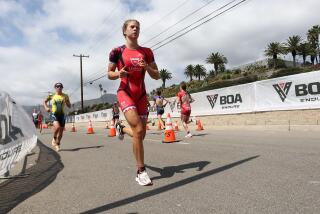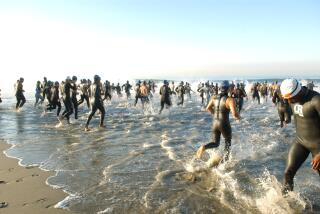Steeling Themselves : Three Area Athletes, Each With Chance to Win, Gird for Ironman Triathlon
- Share via
In baseball an ironman is Cal Ripken playing in 2,009 consecutive games. In football an ironman is someone who plays both offense and defense.
But Ripken rarely must run more than 30 yards at a time. A two-way football player works hard, but after two or three hours he is peeling off his pads.
Try this for an ironclad ironman definition: Someone who swims 2.4 miles in the ocean, dries off and immediately races a bicycle 112 miles, hops off and immediately runs a 26.2-mile marathon.
Eight to 16 hours straight of grueling, solitary physical activity. No one to talk to, no one to lean on.
And many ironmen aren’t men at all.
Three area ironfolk will compete Oct. 15 in the Ironman Triathlon world championship on the Kona Coast of Hawaii.
Two are women with everyday jobs who spend their, ahem, leisure time swimming, running and cycling distances greater than many people drive. The other is a man who worked all his life so he could spend his, ahem, retirement . . . you guessed it, swimming, running and cycling.
Tracy Sproule, 23, has been self-reliant since leaving home during high school. She is a customer service administrator at a semiconductor firm in Ventura. Her fellow employees are so impressed by her dedication as a triathlete they donated more than $1,000 to help pay her expenses to Hawaii.
Becky Ilagan, 51, of Thousand Oaks, is an indefatigable paralegal taking classes toward a law degree. She is competing in the Ironman world championship for the second time after spending her adult life running marathons and racing bicycles in an obsessive search to revisit a sweat-induced nirvana.
Jack Perrodin, 65, is a retired dentist from Chatsworth who won the age-55 world championship in 1984 and finished second in the age-60 division in 1989. Once an overweight smoker and drinker, Perrodin takes breaks from triathlons by competing in ultramarathons, running 100 miles in about 24 hours.
How do they do it?
“You’ve got to have the will,” Ilagan said. “The physical discipline is a given, but the mental discipline must go far beyond what you could expect from your body.”
Why do they do it?
“It started for me as a substitute for drinking, but it has gone far beyond that,” Perrodin said. “I’ll be running or biking and just get overwhelmed with positive feelings. I think, God, this is wonderful.”
When do they do it?
“I take a 100-mile bike ride Saturdays and run for an hour directly after that,” Sproule said. “On Sundays I do a 20-mile run and a one-mile ocean swim. I work out during my lunch hour and nearly every day after work.”
For triathletes, the Ironman world championship is the pinnacle. An event that began 16 years ago by 15 people on a dare has grown into a prestigious race that will be televised by NBC Dec. 11.
Sixteen qualifying races throughout the country whittle down 25,000 athletes to the 1,500 who compete in Hawaii. There are 24 age classifications, including Ironkids for youths 14 and under who cover a shortened course.
The world triathlon record for men is 8 hours 1 minute 32 seconds, set by Dave Scott. The course record at the world championship is 8:07:45 set by Mark Allen, 35, who has won five titles in a row.
The world record for women is 8:50:00 by Paula Newby-Fraser, 30. She also holds the course record in Kona of 8:56:23.
The local trio won’t be setting any world records. But the goal of winning their age classification is very real.
Perrodin is making his third trip to the Ironman. He was age-55 champion 10 years ago with a time of 12:45 and was second at age 60 in 1989 with a time of 12:41.
“He is unbelievable,” said Todd Lieman, a spokesman for the Ironman world championship. “He stands a good chance of winning.”
Ilagan has qualified two years in a row. Last year she finished in about 16 hours after making “rookie mistakes” such as not wearing socks while cycling. But Hawaii already is Ilagan’s island: She won the U.S. Cycling Federation state championship there in 1989.
“If she runs smart and sticks to her race plan, she should do quite well,” said Robb Fukutomi, president of the Ventura-based Fleet Feet running club of which Ilagan and Sproule both belong.
A more-competitive age classification awaits Sproule, who qualified for the Ironman for the first time. For a novice, she could do surprisingly well.
“Tracy is a talented triathlete,” Fukutomi said. “The day of the race will be like a giant science project for her. She has done her homework.”
The Ironman doubles the distances Sproule has previously raced. Her qualifying race, Mike and Robb’s Most Excellent Triathlon Aug. 14 in Ventura, was a half-triathlon, consisting of a 1.2-mile swim, 56 miles of cycling and 13.1 miles of running.
Sproule is more concerned with the increased mental challenge.
“I have cried many times during training runs,” she said. “The mental highs and lows of triathlons are very frustrating. You can be singing to yourself, feeling great, then 10 seconds later drop into a low and actually break down.”
Proper nutrition during the race is crucial to staying off an emotional roller coaster, Ilagan said.
“The secret is making sure you replace all the minerals,” she said, crediting her nutritionist, Dr. Al Garbutt of Burbank. “I take so many supplements I couldn’t tell you them all. At last year’s Ironman I saw athletes needing three and four IVs.
“My nutritionist had me so dialed in all I needed when I finished was a glass of water.”
Perrodin also enjoys a glass of water after training, which is a far cry from his lifestyle 20 years ago. By his own admission, he drank every night and on weekends, smoked three packs a day and had 195 soft pounds on his 5-foot-9 frame.
“I was pretty pudgy, pretty round,” he said.
At the urging of a neighbor, Stan Block, Perrodin began jogging and changed his eating habits. He and Block still run together nearly every morning.
“There are negative addictions and positive addictions,” said Perrodin, who weighs 153 pounds. “You might even say that overdoing it with exercise can be negative. I’ve learned to back off. I’ll take two to three months of rest after (the Ironman).”
As a 16-year-old Oxnard High student, Sproule set off on her own after her parents divorced in 1987. She earned her degree while holding three jobs.
“My paychecks totaled about $25 more than my rent,” she said. “I grew up fast. And I guess it made me mentally tough. I constantly battle controlling my mind during training, and I think my background probably helps me with that.”
The sheer number of private thoughts a triathlete has during eight to 15 hours of intense exertion must be astronomical. Focusing those thoughts is a challenge as great as preparing the body.
“I always think in positive terms,” Perrodin said. “I tell myself, ‘I’m going to win. I will do it.’ It’s always, I will .
“I have the word ‘tough’ written on my handlebar. When I’m feeling wimpy I say ‘I’m tough’ over and over, like a mantra.”
In pushing her body to its limit, Ilagan knows her mind will be pushed somewhere it has been only once: during last year’s Ironman.
“I’m looking forward to reaching that mental state, that power point we forget about or are not even aware of until we have no choice and must go there to find strength,” she said.
“Once you’ve been there, darn right you want to go back, as painful as it’s going to be.”



